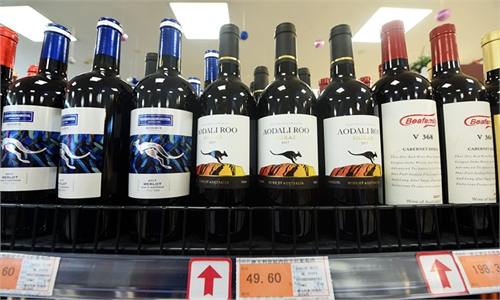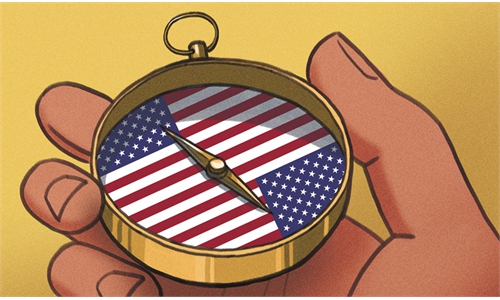COMMENTS / EXPERT ASSESSMENT
Hostile rhetoric will further hurt Australian trade

Illustration: Tang Tengfei/GT
After due investigation and deliberation, China formally announced anti-dumping tariffs on imported Australian wines with the righteous purpose to protect the local wine industry and ensure fair business competition. Instead of taking substantive measures to make changes to its relevant policies and practices, officials in Canberra started a new round of rhetoric of hostilities toward China, further ratcheting up tensions by weaponizing trade issues.Australia will "vigorously defend" its wine industry as it faces higher tariffs from China, David Littleproud, Australia's minister for agriculture, said in an recent interview.
Littleproud knows very well that the Chinese market could be salvaged only when policy solutions are offered to put an end to the current dumping and subsidy practices in Australia, but instead he baselessly blamed China for "playing games with respect to market mechanisms," and vowed to find alternative markets for Australian wine.
Given the enormous scale of the Chinese wine market, it's simply unfeasible to find diversified substitute export destinations for Australia's wine products. China is Australia's biggest wine export market, purchasing about 37 percent of Australian wine exports, according to media reports.
With more than a decade of strenuous efforts to cultivate the Chinese market, to take emergent measures to resolve the dumping issue and revitalize sales operation in China are the sensible and practical choice for Australia. It would be almost futile to daydream about cultivating new markets, which are in reality smaller in size and much less dynamic, to replace China's mature and fast-growing market. This scenario has been previously proved by Australia's stumbling attempts to find alternative markets for barley and lobster, sustaining one fiasco after another for Australian farmers and exporters.
There is abundant evidence to prove the occurrence of dumping and subsidies Australia's wine export to China, which created unfair conditions for competition, bringing substantial damage to the Chinese wine industry and squeezed out wine products from other countries. However, Australia's trade minister Dan Tehan on Saturday speciously threatened to take China to the World Trade Organization (WTO) over the issue.
WTO's arbitration mechanism has its own procedures to investigate and resolve trade disputes, and with the US sabotage efforts during the Trump administration, there is at present a grave shortage of qualified arbitration judges in the system. Against this background, Australia's attempts to lodge complaints to the WTO are more about playing victim with the aim of attracting international attention. It is plain to any eye that Canberra aims more at stoking up sensationalism to frame China, rather than expecting practical outcomes.
If Australian politicians want to start another round of publicity stunts at WTO with the same victim narrative for barley months ago, they are expected to encounter more roadblocks and doomed to fail eventually.
Canberra's barley complaint at the WTO has been reportedly casted into limbo. The WTO meeting scheduled on Friday for Australia to formally lodge its complaint has been delayed and faces ongoing uncertainties, as reported by the Australian Financial Review. This time, Australia's trade minister may find himself in another deadlock trying to stirring up a storm in a wineglass.
Political opportunists in Canberra have got so used to political manipulation on trade issues and spinning any available issue into weapons to collaborate with the US' strategy to contain China. Former Australian Speaker of the House Bronwyn Bishop recently made the belligerent remarks that Australia must be "ready to fight" China if the time comes.
By driving the downward spiral of diplomatic and trade ties with China into the dangerous abyss, Australian politicians are taking a reckless and irresponsible approach of serving US interests at expense of Australia's own interests.
The allied diplomacy approach the Biden administration has taken is US-centric in essence. It is to serve the US' strategy to maintain its global hegemony. When US diplomats brought up Australia at the Alaska dialogue, they were in fact prodding Australia further down the anti-China way of no return.
China continues to hold an open attitude to seek mutually beneficial economic cooperation and restore proactive trade and other relations with Australia while trying to bridge differences. However first and foremost, Canberra must recognize that to solve current trade woes, it must bring its current hostility toward China to an end with concrete actions. Some people in Australia have been vociferously calling for diversification of markets and trade relations, which means in essence to decouple with Australia's biggest trade partner, China. However, by investing otiose hopes in the US and its anti-China strategies, Canberra is simply senselessly putting all eggs into the wrong basket.
The author is a professor and director of the Australian Studies Centre, East China Normal University. bizopinion@globaltimes.com.cn


